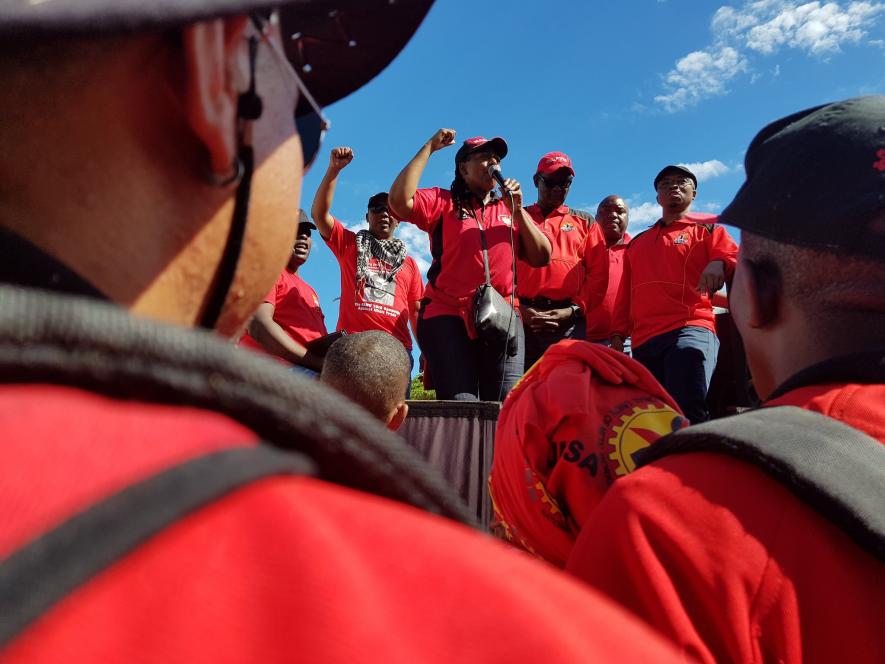Workers March Against Anti-labour Provisions in South Africa

Image Courtesy: SAFTU
Intensifying their actions ahead of the upcoming General Strike on April 25, the South African Federation of Trade Unions (SAFTU) on Thursday organised a protest march from Cape Town to Parliament. Along with the Water Crisis Coalition and other affiliates, SAFTU demanded an end to the exploitation of workers and the privatization of resources.
Coming down heavily on President Cyril Ramaphosa’s government, SAFTU said he was imposing a ‘slave minimum wage’ and undermining the hard-earned right of workers to strike. Criticizing the “anti-labour and anti-poor” policies of the government, SAFTU in its statement further said that, “just as Jan van Riebeeck distracted our forebears with shiny objects whilst stealing the land [from] behind their backs, so does the ANC want us to believe that President Ramaphosa represents a new dawn”.
SAFTU is the second largest federation of trade unions in the country and comprises 30 organisations representing nearly 800,000 workers. The federation of unions has called for a direct action day on April 25 against the introduction of the National Minimum Wage (NMW) Bill and the amendments proposed to the Labour Relations Act (LRA) and the Basic Conditions of Employment Act (BCEA).
Calling the proposed National Minimum Wage, which will come into force from Mary 1, a ‘slave wage’, SAFTU said this bill would replace all current sectoral determinations and any benefits that they bestowed on workers. As per the NMW Bill, the minimum wage for most workers will be Rand 20 [per hour], with farmers and domestic workers getting R18 and R15 per hour respectively. On the other hand, the average pay of executives of the top 100 companies in South Africa is around R8,625 [per hour].
Referring to the Marikana massacre, which took place on August 16 2012, SAFTU said that, “this NMW Bill pours cold water on the militant struggles of the immortal mineworkers who were massacred for demanding R12,500 [per month] and outsourced workers marching in the streets in demand of R10,000.” Around 34 miners on strike were shot dead by South African police at the mine owned by the British company, Lonmin, in the Marikana area sparking the largest protests in the post-apartheid era in South Africa.
The current President, Ramaphosa, was a non-executive director of Lonmin when the killing of the miners happened, and allegedly had called on the authorities to take “concomitant action” against them in the days before the massacre. Ramaphosa later “apologised”, saying he was “sorry for the type of language he used at the time”.
In addition to the NMW Bill, the amendments proposed to the LRA and the BCEA have been a bone of contention between the government and trade unions. The amendments propose a secret ballot by the workers before they embark on a strike, which will be organised by the unions themselves, with the employers given the right to monitor the process of secret balloting.
Workers and unions argue that involving the employers basically kills the spirit of a strike and gives the management further powers to manipulate a strike. “It will take away the right of worker to strike,” said SAFTU.
SAFTU alleged that the move would give employers the opportunity to interdict strikes on the basis of allegations that in some part of the country, mistakes were committed during the balloting.
The protesters submitted a memorandum of demands to the speaker of the Parliament and called upon the government to scrap the ‘draconionian bills’. They also demanded free education at all levels with funds raised from taxing the rich and increasing corporate tax.
“We call on the dismissal of all criminal cases against students and workers as a result of their participation in the Fees Must Fall campaign.” read the memorandum of demands. Fees Must Fall was a student-worker-led movement in October 2015 against the increase in university fees and the outsourcing of workers in the University of Witwatersrand SRC and spread to the University of Cape Town and Rhodes University. More than 160 students and workers were arrested during the protests.
The SAFTU-led marchers also expressed their solidarity with Palestinians and their struggle against Israel’s occupation. Drawing parallels between the South African people’s struggle against apartheid and the struggle of the Palestinian people, the protesters said that there was the need for the same kind of global solidarity campaign against “this new Israeli variety of apartheid”.
In another memorandum submitted jointly by SAFTU and the Water Crisis Coalition (WCC) to the City of Cape Town through Mayor Patricia De Lille, the authorities were called upon to end the privatization of water and other services. “We believe that air, water, land and food are part of the global commons. These areas should not be exposed to exploitation and profiteering in any form,” noted the memorandum.
"It is clear that government does not want to save water, but the intention is to force water management devices on to everyone in an attempt to move towards pre-paid meters, which will allow for the increase of the [price of] water at will," said WCC representative Michael Helu.
"If you don't have money in your pocket, you don't get water," he noted.
Rejecting the proposed budget of the City of Cape Town for 2018-19 as anti-poor, the protesters said that there had been unaffordable increases in prices of basic services, and condemned the lack of provision of decent housing for all.
Warning the government of further action, the SAFTU General Secretary said that "on the 25th of April, we are closing down the country, whether they like it or not."
Get the latest reports & analysis with people's perspective on Protests, movements & deep analytical videos, discussions of the current affairs in your Telegram app. Subscribe to NewsClick's Telegram channel & get Real-Time updates on stories, as they get published on our website.
























